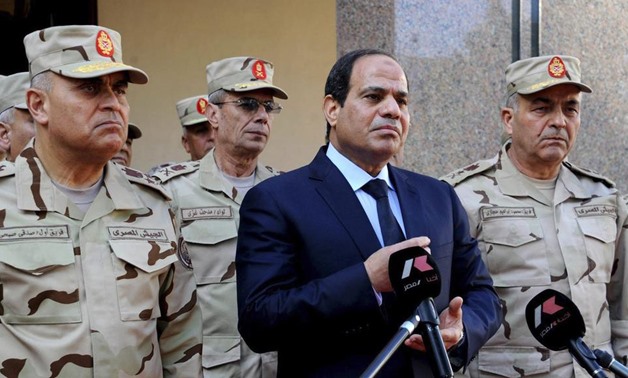CAIRO - 30 June 2018: People rushed onto the streets on June 30, 2013 only one year after the Muslim Brotherhood came to power, searching for the democracy that they apparently lacked.
 Protesters opposing Egyptian President Mohamed Morsi set off fireworks during a protest at Tahrir Square in Cairo June - Reuters
Empowerment request
Protesters opposing Egyptian President Mohamed Morsi set off fireworks during a protest at Tahrir Square in Cairo June - Reuters
Empowerment request
Late in July 2013, only few days before the dispersal of pro-Morsi protest in Rabaa Al-Adaweya square by security forces, Colonel General Abdel Fatah al-Sisi called on Egyptians to gather in the streets to "empower" him to fight terrorism. Subsequently, people appeared in the streets reportedly in millions.
2014 constitutional referendum
Following the ousting of Morsi, Abdel Fatah al-Sisi, army chief general at the time, announced in a statement suspending the Muslim Brotherhood 2012 constitution, and he called for an early election.
A committee of 10 legal experts was formed with the aim of amending the 2012 constitution. The committee managed to accomplish its mission in August 2013.
Former acting president Adly Mansour formed a committee of 50 people and their names were announced in September. The 50 members represented different institutions including Al-Azhar and the church. In December 2013, the committee introduced the final draft of the constitution for referendum.
Al-Jamaa al-Islamiya (Islamic group) that was designated by the U.S. as a global terrorist organization and who was reportedly responsible for assassinating former President Anwar al-Sadat, announced boycotting the referendum. In a statement, the group said it would launch public campaigns to call for boycotting the “coup constitution.”
Ministry of Endowments and Religious Affairs announced in December 2013 banning famous Salafist sheikhs Abu Ishaq al-Huwaini, Mohamed Hassan, Mohamed Hussein Yacoub from mounting mosque pulpits and delivering sermons, after they announced boycotting the election.
Nabil Salib, head of the Supreme Election Committee, said that 20.5 million out of a 53 million electorate participated in the vote.
2014 presidential election
About 10 months after the revolution, Field Marshal Abdel Fatah al-Sisi announced running for president and resigning from his military post.
Before the 2015 presidential election was held, the Muslim Brotherhood defamed Sisi and used various forms of propaganda against him, including graffiti.
However, MB members could not agree to vote for the Egyptian Popular Current Chairman Hamdeen Sabahi, who ran solely against Sisi in the election, as Sabahi was one of the main opposition leaders during Morsi’s era.
In addition, Sabahi belonged to the National Front, which was formed in November 2012. The National Front opposed Morsi’s decrees and called for protesting against the latter in June 30.
Judge Anwar al-Asi, head of the presidential election committee, said that Sisi won 96.9 percent of votes, with a turnout of 47.45 percent.
2018 presidential election
Undoubtedly, a considerable number of Egyptians expected a low turnout in the 2018 presidential election, saying that there is no real contender to Sisi in the vote.
Some of them said that Moussa is not a strong challenger to Sisi, so they decided not to vote, although some of them said they are Sisi supporters.
Manal Abdel Aal posted on Twitter that she met many people who support Sisi but would not cast their votes because they think that he will win the race anyway. She also referred to the time when millions of Egyptians demonstrated in the streets in the January 25 Revolution, while others preferred to support them while staying at home.
The Egyptian leader garnered 97.08 percent of valid votes in the presidential election, where more than 21.8 million people voted for him, according to formal reports. The turnout stood at 24,254,152 voters, representing 41 percent of 50,078,138 registered voters.
In a televised speech after winning the election, Sisi pledged to keep his promise in serving the nation and thanked all Egyptians for trusting him to lead the country.
High approval ratings
After 28 months in office, the Egyptian Center for Public Opinion Research, Baseera, conducted a survey to measure Sisi's approval ratings, finding that President Sisi enjoys a 68 percent approval rating, a figure that stands higher than what most presidents enjoy.
Although there were many reasons why approval ratings were high, the most prominent reasons where, the Suez Canal project, improved security, the economic reform plan, improved infrastructure and increased social housing.
 President Sisi approves high approval rating. - baseera official website
President Sisi approves high approval rating. - baseera official website
More recently, the 2018 Presidential Election verified Sisi's high approval ratings, when Sisi garnered 97.08 percent of valid votes in the presidential elections last week, where more than 21.8 million people voted for him. His hardly-known competitor received 656,534 votes, making up 2.9 percent of the valid ballots. The turnout stood at 24,254,152 voters; 41 percent of the electorate.
Much like the 2014 election, where Sisi competed against well-known politician Hamdeen Sabahy, void votes ranked second in the poll.
In 2018, void votes made up 7.27 percent of the total votes, accounting for 1.762 million ballots. If void votes are not exclude from the result, Sisi's share of the total votes would be 90 percent.
In a press conference, the National Elections Authority announced the unsurprising figures, yet its head, judge Lachine Ibrahim, applauded the turnout of Egyptian expats abroad and the judicial supervision of the poll.
In the 2014 vote, 23.4 million people voted for Sisi, void votes accounted for one million ballots, and Sabahy amassed 740,000 votes. In 2014, President Sisi had competed against el-Ghad Party chairperson Moussa Moustafa Moussa.



Comments
Leave a Comment